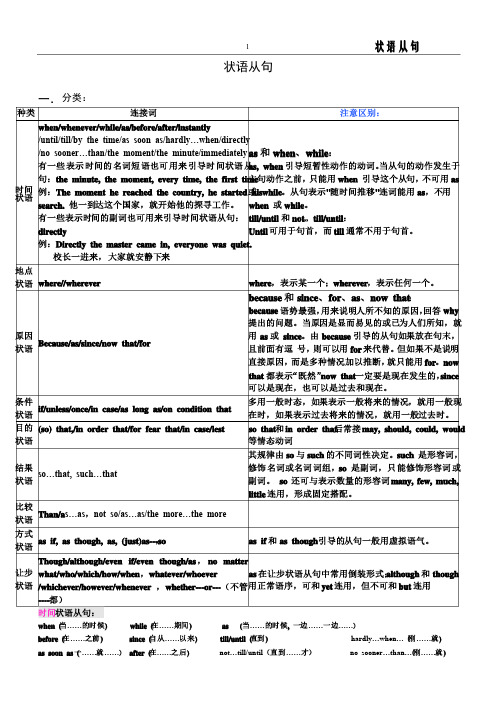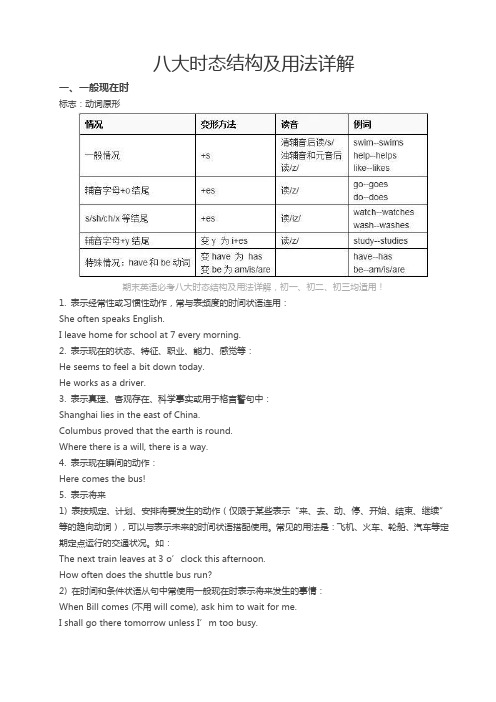与各种时态连用的时间状语
初中英语八大时态总结

初中英语八大时态总结一、一般现在时具体情况(主要用于下面几情况)1)描述当前时间内经常出现、反复发生的动作或存在的状态。
在这种情景中,句子常带有表示频率的时间状语:always,everyday,often,onceaweek性的、(month,year,etc.),sometimes,seldom,usually等等,以表示句中的动作或状态是习惯经常性的。
例如:。
业Theyraiseducksasasideline.他们以养鸭为副Itseldomrainshere.这儿很少下雨。
等等。
2)仅为了描述状态、性质、特征、能力这里的目的是为了"描述现阶段的动作或状态",其重点"不是强调动作发生的时间、或进行的状态"。
例如:Hecanspeakfiveforeignlanguages.他能说五种外语。
Thatisabeautifulcity.那是座美丽的城市。
3)陈述客观事实、客观真理。
顾名思义,客观的情况是"没有时间概念"的;也"不会在意动作进行的状态"。
例如:Thesunrisesintheeast.日出东方。
4)根据英文语法规定,当主句的谓语动词是一般将来时,那么时间或条件状语从句的谓语动词只能用一般现在时来表示将来要发生的动作。
例如:息。
I'lltellhimthenewswhenhecomesback.他回来时,我将告诉他这个消*【用于一般现在时的副词,除了上面提到的一些表示频率的以外,常见的还有:now,today, nowadays等等】二、一般过去时具体情况(主要用于下面几情况)1.主要是用来描述在过去某个时候发生的动作或存在的状态。
它也可以用来表示在过去某段时间里经常发生的习惯性动作。
例:Iwasverythininmychildhood.-ed(除不规则动词外)。
常2.一般过去时由谓语动词的过去式表示,也就是说动词词末要加和一般过去时连用的过去时间状语有:lastnight(week,month,year,century,etc.), yesterday,thedaybeforeyesterday,yesterdaymorning(afternoon,evening),in1999,two hoursago(oneweekago,treeyearsago,等等。
英语中八种时态的具体用法

英语中八种时态的具体用法(1)一般现在时表示现阶段经常或习惯发生的动作或存在的状态,或说明主语的特征。
①一般现在时句子中常有的时间状语:often,usually,sometimes,always,every(day等),once/twice,a (week等), on (Sunday等),never,in the(morning等)。
如:They go to the Palace Museumonce a year.(他们每年去一次故宫)/ They oftendiscuss business in the evening.(他们经常在晚上商谈生意)②表示客观真理、事实、人的技能或现在的状态时句子里一般不用时间状语。
如:The earth turns round thesun.(地球绕着太阳转)/ Light travels faster thansound.(光传播比声音快)③表示十分确定会发生(如安排好的事情)或按照时间表进展的事情,用一般现在可以表达将来,句子中可以有将来时间。
如:The train for Haikou leaves at 8:00 in themorning.(开往汉口的列车上午8点开车)④在时间状语从句中(以when, after, before, while, until,as soon as等引导)与条件状语从句中(以if,unless引导),用一般现在时代替一般将来时,句子可以有将来时间。
如:Please ring me up as soon as you arrive inGermany.(你一到德国就给我打)/ If it rainstomorrow,we will have to stay at home.(如果明天下雨我们就只好呆在家)⑤一般现在时用于倒装句中可以表示正在发生的动作,动词以come, go为主。
如:Here comes the bus. (车来了)/ There goes the bell.(铃响了)。
(完整word版)英语动词时态专讲

动词时态专讲一、各种时态的构成二、各种时态的用法◆◆一般现在时: 1.表示经常性或习惯性的动作;2.用在客观真理, 客观存在, 科学事实或格言警句中。
常与表示频度的时间状语连用;3.由when, as soon as, until, before, after引导的时间状语从句或由if, unless, as long as, once引导的条件状语从句中, 一般现在时代替一般将来时。
时间状语: every day, everyother day, sometimes, often, usually, on Sunday …1.I (leave) home for school at 7 _________________ (每天早晨).2、The earth ___________ (go) the sun.3、Shanghai lies in the east of China.上海__________中国的东方。
4.My teacher told us that light _________ (travel) faster than sound.5.Didn’t you father tell you that the sun ________ (be) much larger than the moon?6.I’ll help you as soon as I ___________(到达) Beijing tomorrow.7、I won’t leave unless you __________ (tell) me everything.跟踪练习: 1.Smith does not go fishing on weekdays, ____? _____ , he does.A.does he…NoB.does he…YesC.doesn't he…NoD.doesn't he…Yes2.Mr.Black often _____ fishing on Sundays, _____ he ?A.goes…doesn'tB.goes…isn'tC.doesn't go…doesD.doesn't go…is3.____he ___himself there? No, I don't think so. A.Do…enjoy B.Does…enjoies C..Does…enjoy4.___ your teacher __ from them very often? Certainly.A.Do…hear B.Does…hear C.Do…receive D.receive5._____ your mother _____ some cleaning on Sundays A.Does…does B.Do…does C.Does…do D.Do…do一般过去时: 1.表示在确定的过去时间里所发生的动作或存在的状态。
过去完成时的判定方法

过去完成时的判定方法一、由时间状语来判定:表示某动作发生在过去某时间之前。
一般说来,各种时态都有特定的时间状语。
与过去完成时连用的时间状语有:1. by + 过去的时间点。
昨晚九点我已看完这本小说了。
I reading the novel by 9 o'clock last night.2. by the end of + 过去的时间点。
到上学期末我们已经学了二千多个英语单词。
We over two thousand English words by the end of last term.3. before + 过去的时间点。
如:在上星期三之前,他们已经种了六百棵树了。
They six hundred trees before last Wednesday.4. By the time + 从句(一般过去时)我到达电影院时,电影开始5分钟了。
By the time I got to the cinema,the film on for 5 minutes.二、由“过去的过去”来判定:过去的两个动作进行比较,有先后关系。
(1 )宾语从句中当宾语从句的主句为一般过去时,且从句的动作先于主句的动作时,从句要用过去完成时。
在told, said, knew, heard, thought等动词后的宾语从句。
如:她说她已经看过这部电影了。
She said that she the film before.They said they ( have) breakfast.(2 )状语从句中在时间、原因、等状语从句中,主、从句的动作发生有先后关系,动作在前的,要用过去完成时,动作在后的要用一般过去时。
如:做完作业后,他上床睡觉了。
After he his homework, he went to bed.When he arrived home , his father (die) an hour.Before I got home,he ( fall) asleep.Hdidn’t came here because he (see) the film twice.注意:before, after 引导的时间状语从句中,由于before 和after 本身已表达了动作的先后关系,若主、从句表示的动作紧密相连,则主、从句都用一般过去时。
状语从句(完整归纳)

状语从句一.分类:种类连接词注意区别:时间状语when/whenever/while/as/before/after/instantly/until/till/by the time/as soon as/hardly…when/directly/no sooner…than/the moment/the minute/immediately有一些表示时间的名词短语也可用来引导时间状语从句:the minute, the moment, every time, the first time例:The moment he reached the country, he started hissearch. 他一到达这个国家,就开始他的探寻工作。
有一些表示时间的副词也可用来引导时间状语从句:directly例:Directly the master came in, everyone was quiet.校长一进来,大家就安静下来as和when、while:as, when 引导短暂性动作的动词。
当从句的动作发生于主句动作之前,只能用when 引导这个从句,不可用as或while。
从句表示"随时间推移"连词能用as,不用when 或while。
till/until和not…till/until:Until可用于句首,而till通常不用于句首。
地点状语where//wherever where,表示某一个;wherever,表示任何一个。
原因状语Because/as/since/now that/forbecause和since、for、as、now that:because语势最强,用来说明人所不知的原因,回答why提出的问题。
当原因是显而易见的或已为人们所知,就用as或since。
由because引导的从句如果放在句末,且前面有逗号,则可以用for来代替。
但如果不是说明直接原因,而是多种情况加以推断,就只能用for。
大学英语语法--16种时态

英 语 的 16 种 时 态英语共有十六种时态,其表现形式如下(以study 为例) 一般时 进行时 完成时 完成进行时现在 study be studying have studied have been studying 过去 studied be studying had studied had been studying 将来 will study wil be studying will have studied will have been studying 过去将来would study would be studying would have studied would have been studying 一、一般时态 1、一般现在时(1)一般现在时表示没有时限的持久存在的动作或状态或现阶段反复发生的动作或状态,常和副词 usually ,often ,always sometimes , regularly ,near ,occasionally ,every year, every week 等连用。
例如: 1)The moon moves round the earth.. 2)Mr. Smith travels to work by bus every day. (2)在由after ,until ,before ,once ,when ,even if ,in case ,as long as ,as soon as ,the moment 以及 if ,unless 等引导的时间状语从句或条件状语从句中,通常用一般现在时代替将来时。
例如: 1)I will tell him the news as soon as I see him. 2)I will not go to countryside if it rains tomorrow. (3)某些表示起始的动词,某些表示起始的动词,可用一般现在时表示按规定、可用一般现在时表示按规定、可用一般现在时表示按规定、计划或安排要发生的动作,计划或安排要发生的动作,计划或安排要发生的动作,这类动词有:这类动词有:be ,go ,come ,start ,depart ,arrive ,begin ,leave 等。
初中英语八种时态一览表 (精华版)

初中英语八种时态一览表 (精华版)作发生在现在之前,常用于叙述过去的经历和事件。
通常与具体时间状语连用,如yesterday。
last week。
two years ago 等。
例如:Yesterday。
I went to the park with my friends.现在进行时表示现在正在进行的动作或状态。
通常用于现在时态的句子中,使用现在分词形式。
例如:I am studying English now.过去进行时表示过去某一时刻正在进行的动作或状态。
通常与具体时间状语连用,如yesterday at this time。
while I was cooking dinner等。
使用过去式be动词(were/was)和动词的现在分词形式。
例如:I was watching TV when he called me.一般将来时表示将要发生的动作或状态。
通常用于表示未来的计划或打算。
使用will/shall加动词原形。
例如:I will go to the XXX.过去将来时表示过去某个时间点将要发生的动作或状态。
通常与具体时间状语连用,使用过去式be动词(were/was)和动词的原形。
例如:Yesterday at this time。
I was going to theparty with my friends.现在完成时表示过去发生的动作对现在的影响或过去延续到现在的动作或状态。
使用have/has加动词的过去分词形式。
例如:I have finished my homework。
so I can relax now.过去完成时表示过去某个时间点之前已经完成的动作或状态。
通常与具体时间状语连用,使用had加动词的过去分词形式。
例如:By the time I arrived。
he had already left.需要使用连词that来引导。
When writing an article。
八大时态结构详解

八大时态结构及用法详解一、一般现在时标志:动词原形期末英语必考八大时态结构及用法详解,初一、初二、初三均适用!1. 表示经常性或习惯性动作,常与表频度的时间状语连用:She often speaks English.I leave home for school at 7 every morning.2. 表示现在的状态、特征、职业、能力、感觉等:He seems to feel a bit down today.He works as a driver.3. 表示真理、客观存在、科学事实或用于格言警句中:Shanghai lies in the east of China.Columbus proved that the earth is round.Where there is a will, there is a way.4. 表示现在瞬间的动作:Here comes the bus!5. 表示将来1) 表按规定、计划、安排将要发生的动作(仅限于某些表示“来、去、动、停、开始、结束、继续”等的趋向动词),可以与表示未来的时间状语搭配使用。
常见的用法是:飞机、火车、轮船、汽车等定期定点运行的交通状况。
如:The next train leaves at 3 o’clock this afternoon.How often does the shuttle bus run?2) 在时间和条件状语从句中常使用一般现在时表示将来发生的事情:When Bill comes (不用will come), ask him to wait for me.I shall go there tomorrow unless I’m too busy.标志:动词过去式期末英语必考八大时态结构及用法详解,初一、初二、初三均适用!*闭音节:元音字母a, e, i, o, u如果发字母本来的音则称为开音节,否则称为闭音节。
- 1、下载文档前请自行甄别文档内容的完整性,平台不提供额外的编辑、内容补充、找答案等附加服务。
- 2、"仅部分预览"的文档,不可在线预览部分如存在完整性等问题,可反馈申请退款(可完整预览的文档不适用该条件!)。
- 3、如文档侵犯您的权益,请联系客服反馈,我们会尽快为您处理(人工客服工作时间:9:00-18:30)。
与各种时态连用的时间状语一、常与一般现在时连用的时间状语:1、副词:always often never sometimes usually2、短语:every day / week / month / year once a week hardly everevery ten minutes 每十分钟every other ten minutes 每隔十分钟now and then 不时from time to time 不时另:客观事实、客观真理只用一般现在时eg: He always stud ies very hard.They sometimes go to school on foot.Ken doesn’t clean his teeth every day.The No. 2 bus pass es here every fifteen minutes.Do you visit your uncle now and then?附:一般现在时的基本句型:肯定句:He / She / It / sb. does sth.否定句:He / She / It / sb. doesn't do sth.疑问句:Does he / she / it / sb. do sth.?肯定句:I / You / We / They / 复数名词do sth.否定句:I / You / We / They / 复数名词don't do sth.疑问句:Do I / You / We / They / 复数名词do sth.?二、常与一般过去时连用的时间状语:1、副词:yesterday2、短语:last week / month / year / night last Mondayyesterday morning / afternoon / evening last Mayjust now = a moment ago two days agothe day before yesterday the other day 前几天in (已过去的)某年/ 月on (已过去的)某天at (已过去的)几点钟与某些从句连用eg: He always stud ied hard last year.Mr. Smith came to see our teacher yesterday afternoon.Did you meet him the other day?They left here at 8:00.Andrew’s father went to Australia in 1978.He went to sleep after he finished his homework.I didn’t hear from him a week ago.The sports meet began on September 20.附:一般现在时的基本句型:肯定句:sb. did sth.否定句:sb. didn't do sth.疑问句:Did sb. do sth.?三、常与现在进行时( is / am / are doing )连用的时间状语:1、副词:now2、某些警示性动词如:look listen1eg: Look! They are playing football.He isn’t reading English now.四、常与一般将来时( will / shall / be going to do )连用的时间状语:1、副词:tomorrow2、短语:next Sunday / week / month / year how soonin + 时间段/ (将来的) 某年/ 月after + 时间点on (将来的) 某天in the futureeg: We will have an English Evening tomorrow.He’ll be back in two hours.Our school will build another library in 2004.Tom will leave for Beijing after 9: 00 o’clock.at 9: 00 o’clock.How soon will you write to Anne?She will be ten years old on Saturday next week.五、现在完成时与一般过去时、一般现在时的区别:现在完成时强调的是动作虽发生或开始在过去,但跟现在有联系一般过去时则强调A)过去某一具体动作,可配过去的具体时间B)过去某一时间内经常发生的动作一般现在时强调现在时间内经常发生的动作或客观事实e.g.: I have done all my homework.I did my homework last night.I often did my homework before dinner last month.I often do my homework before dinner.He works as an engineer in a company.It never snows in Hainan Island.EXERCISES:I.Fill in the blanks with the proper forms of the following words:1.Mary usually _____________ (get) up early in the morning.2.I ____________________ (call) him in half an hour.3.Sue ______________________ ( not do ) any washing last year.4.Listen! Someone _________________________ (knock) at the door.5.They _________________________ (swim) in the river at this time yesterday.6.He ________________________ (not book) the court yet.7.Lucy and Lily ______________________ (not come) to my party tomorrow evening.8.My pencil ______________ (break) while I ______________________ (draw) a horse.29.They _____________________ (play) football when I ___________ (see) them.10.He told the child that the sun ____________ ( go ) down in the west.11.What will he be when he _____________ (grow) up?12.We won’t begin our work until he ___________ (come).13.Sue __________________ (join) the match of next July.14.How long ______________ he ____________ (arrive) at the station?15.How soon __________ he ____________ (arrive)?16.My father ________________ (work) as a doctor ten years ago.17.He never ____________ (tell) a lie when he ___________ (be) a child.18.Sometimes last year, my parents ____________ (come) home very late.19.The baby ______________ (drink) water every two hours.20.He ________________ (call) me every other twenty minutes yesterday.21.It _______________ (snow) heavily on the morning of last Saturday.22.By the end of last year, they ___________________ (write) five songs.23.He ___________ just _____________ (draw) a map.24.They _______________________ (not hand) in their homework the other day.25.He _________________________ (not come) here since last month.26.Next week, I _______________________ (stay) with my aunt for two days.27.Peter and Tim _____________________________ (not have) class at nine yesterday.28.I _________________________ (return) you the book in three days.29.Look! They ____________________________ (not clean) the windows at all!II.Multiple choice:1.What _____ you ______ at this time last Sunday?A. did...doB. have...doneC. were...doingD. are...doing2.He said the train ______ faster than any man.A. runB. runsC. ranD. is running3.How long ___ he ____ in Shenzhen?A. eB. has...arrivedC. will...reachD. has...been4.Many people often _____ rice for supper in south China.A. haveB. hasC. hadD. are having5.She ___ always ___ angry with nothing.A. is...beingB. will...beC. is.../D. /...is6.I didn’t know a word of English until I ____ here.A. cameB. have comeC. had comeD. was coming7.I ____ you about that many times.3A. toldB. tellC. have toldD. am telling8.Water _____ at 100 0 C.A. boilsB. is boilingC. has boiledD. boiled9.Ken ___ up at 6:30 in the morning.A. gotB. getC. getsD. is getting10.How many English words ____ you _____?A. do...learnB. has...learnedC. have...learnedD. will...learn11.I ____ him just now.A. seeB. sawC. have seenD. am seeing12.He ____ his best to learn English well.A. doesn’tB. hasn’t doneC. doD. doesn’t do13.Her new shoes _______ under the bed.A. isB. areC. wasD. am14.Where ____ y ou _____? I’ve looked for you the whole morning.A. have...goneB. did...go toC. are...goingD. have...been15.I ____ him but I ____ to him.A.see...didn’t speakB. saw...spokeC. have seen...haven’t spokenD. saw...didn’t speakI. Choose the right answers to cloze.用括号内适当的形式填空。
